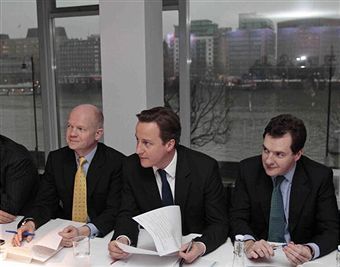 The decision by David Cameron to pull the Tories out of the EPP and form the ECR was a victory of principle and party politics over pragmatism. While many Tory grassroots howled with joy, it is worth examining the practical consequences on Tory influence in the European Parliament – not to reverse the decision, but validate or disprove the oft-made charge that the decision has made the Tories impotent.
The decision by David Cameron to pull the Tories out of the EPP and form the ECR was a victory of principle and party politics over pragmatism. While many Tory grassroots howled with joy, it is worth examining the practical consequences on Tory influence in the European Parliament – not to reverse the decision, but validate or disprove the oft-made charge that the decision has made the Tories impotent.
Let us eschew any discussion about the views of key members of the ECR on Jews; let us also not dwell on whether the Tories have cut themselves off from other centre-right leaders. The first point is a matter of opinion and the second is uncontestable. Let us instead focus on how the ECR has done its work in the legislature.
Research shows that the ECR (alongside the Europe of Freedom and Democracy group) is the group that on average is least often on the winning side of a vote – although it does reasonably well on agriculture divisions. Interestingly, ECR is also doing well on environment issues. Conversely, ECR seems to be isolated on civil liberties issues. Now, being part of a wining coalition is not as important in the EP as it is the House of Commons. If the issue that “won” the vote is detrimental to Britain, then being on the “losing” side will be seen as right and proper.
One of the charges leveled against ECR is that the Tories have less in common with the other members than CCHQ likes to claim. There is a split between the Conservative Party and the Polish Prawo i Sprawiedliwo, which so far has been most visible on agriculture and the environment and less visible in other policy areas. But the EPP’s cohesion is also decreasing on agriculture and the environment. Several parties have separate opinions on agriculture, including the Hungarian Fidesz, the Portuguese Partido Social Democrata and the Austrian Österreichische Volkspartei. (Without the British and the Czech members, the EPP has been more pro-integrationist, less liberal market-oriented, and more likely to reach consensus on most issues).
ECR members attend plenary sessions less than any of the other larger groupings, which may or may not influence their impact depending on how important you see these. It did not prevent the party from halting the plan to extend maternity leave across Europe to 20 weeks on full pay – a move backed by the British Chambers of Commerce.
I am not a fan of the ECR and don’t think many of its continental members subscribe to an enlightened British brand of conservative thinking. Examples are not hard to find. Recently, a number of Law and Justice MPs tabled a parliamentary question demanding the establishment of a special department in the Polish Interior Ministry to “monitor homosexual websites” to prevent what MP Stanislaw Pieta has reportedly called “positive paedophilia”. A very unsavoury view, to say the least.
But many members of other party groupings also hold bigoted views and any judgment on the wisdom of forming the ECR should be made not only on these issues, but on the ECR’s ability to sway votes and push their issues. It is early days, it may not last and it will probably still make a Tory government’s role in Europe harder, but it does not look as bad as once predicted.






Comments